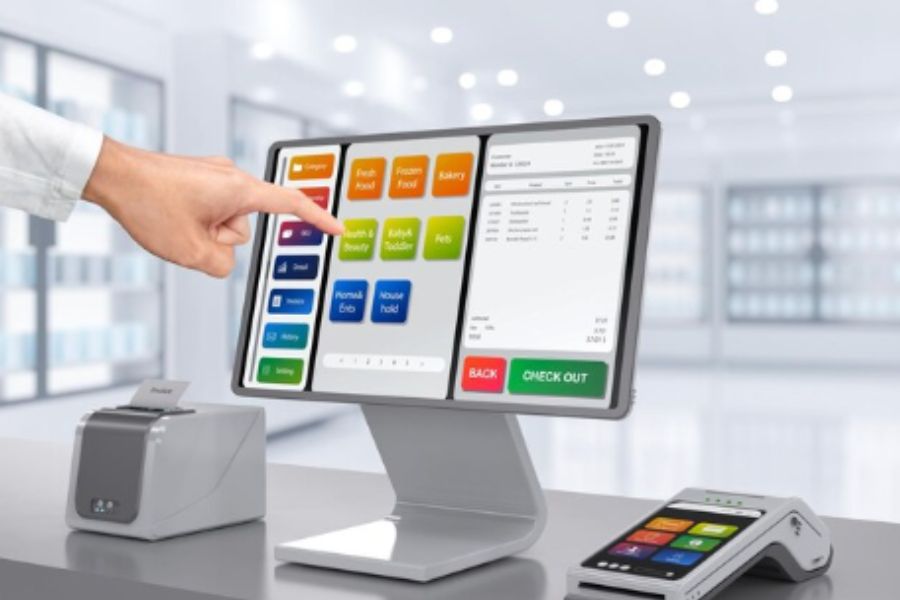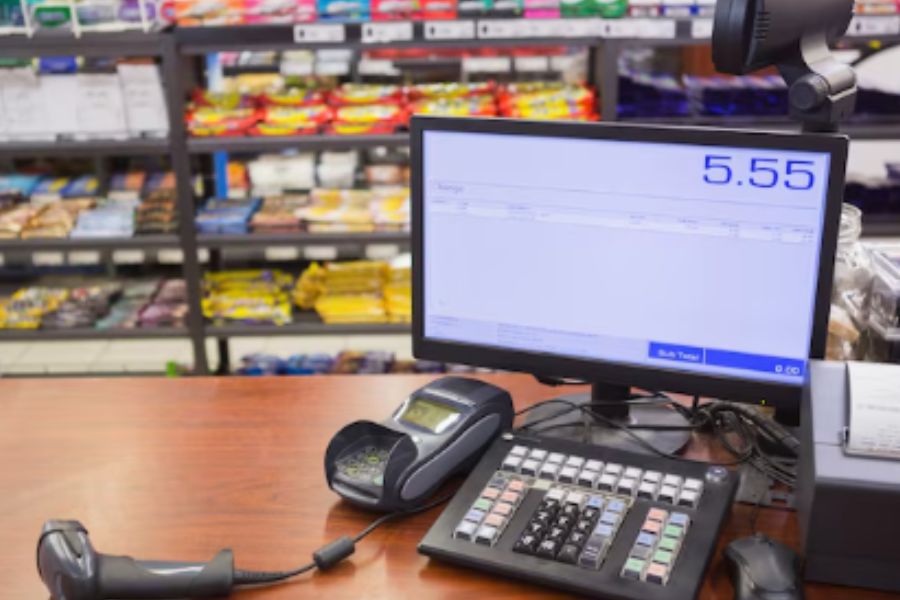In an era dominated by digitalization and environmental consciousness, the concept of going paperless has gained significant traction across various industries. The retail sector, especially in the United Kingdom, has witnessed a paradigm shift in its point-of-sale (POS) systems, transitioning towards paperless solutions.
This article aims to explore the evolution of modern point of sale furniture in the UK, highlighting its features, benefits, implementation process, and considerations for choosing the right system.
Overview of Point of Sale Furniture in the UK
The United Kingdom’s point of sale furniture market offers a diverse range of products catering to various industries and businesses. Point-of-sale furniture encompasses fixtures and displays used in retail environments to showcase merchandise effectively and enhance the overall shopping experience.
Here’s an overview of the point of sale furniture market in the UK:
- Types of furniture: Point-of-sale furniture includes display units, shelving systems, checkout counters, kiosks, and promotional stands. These pieces are designed to optimize space utilization and facilitate product presentation.
- Materials and designs: Manufacturers offer point-of-sale furniture in a variety of materials such as wood, metal, glass, and acrylic. Designs range from traditional to modern, allowing retailers to choose pieces that align with their brand identity and store aesthetics.
- Customization options: Many suppliers offer customization services, allowing retailers to tailor furniture according to their specific requirements. Customization options may include branding elements, size adjustments, and color choices.
- Functionality and durability: Point-of-sale furniture is designed to withstand the rigors of retail environments while providing functionality and durability. Features like adjustable shelves, locking mechanisms, and easy assembly contribute to the practicality of these pieces.
- Distribution channels: The distribution of point-of-sale furniture in the UK involves various channels, including manufacturers, wholesalers, distributors, and retailers. Manufacturers may sell directly to retailers or utilize distributors to reach a broader customer base.
- Market trends: Trends in the UK point-of-sale furniture market include the adoption of eco-friendly materials, modular designs for scalability, and integration of technology such as digital signage and interactive displays.
- Competitive landscape: The market is characterized by both domestic and international players competing to offer innovative solutions and competitive pricing. Key players may include furniture manufacturers, design firms, and specialized retailers.
- Retail sector influence: Growth in the retail sector, including supermarkets, department stores, specialty boutiques, and convenience stores, drives demand for point-of-sale furniture. Changing consumer preferences and evolving retail strategies also impact the market dynamics.
Importance of Going Paperless in UK Retail
In the realm of UK retail, the imperative to go paperless transcends mere convenience—it’s a strategic imperative that resonates with both ecological stewardship and fiscal prudence. By eschewing traditional paper-based processes, retailers can foster a symbiotic relationship with the environment while fortifying their bottom line.
Preserving both the Ecosystem and the Company Finances
Embracing paperless solutions is a tangible commitment to environmental sustainability. By reducing reliance on paper, retailers mitigate their ecological footprint, conserving precious natural resources and minimizing waste.
Concurrently, this eco-conscious approach aligns with consumer preferences, bolstering brand reputation and customer loyalty.
Saving Cost
The transition to paperless operations translates into tangible cost savings for retailers. By eliminating expenditures associated with paper procurement, printing, and storage, businesses can allocate resources more judiciously.
Moreover, the streamlined workflows facilitated by digital systems enhance operational efficiency, further amplifying cost-effectiveness.
Increased Productivity and Efficiency
Digitalization catalyzes productivity gains by streamlining processes and minimizing manual interventions. Paperless systems automate routine tasks, liberating employees to focus on value-added activities such as customer engagement and strategic planning.
The resultant uptick in efficiency translates into tangible benefits, from expedited transaction processing to optimized inventory management.
Enhanced Cooperation
Paperless systems foster seamless collaboration among disparate teams within the organization. Real-time access to centralized data empowers employees to make informed decisions swiftly, driving agility and responsiveness across departments.
This enhanced cooperation cultivates a cohesive organizational culture, facilitating cross-functional alignment and synergy.
Disaster Recovery and Data Security
Digital repositories offer robust safeguards against data loss and security breaches. Cloud-based storage solutions ensure redundancy and resilience, safeguarding critical information from unforeseen disasters or cyber threats.
Moreover, encryption protocols and access controls bolster data security, instilling confidence among customers and stakeholders alike.
Unlimited Mobile Apps and Storage
The advent of mobile technology unlocks unprecedented flexibility and scalability for retailers. Mobile apps enable seamless access to business data and transactional capabilities, empowering retailers to serve customers anytime, anywhere.
Concurrently, cloud-based storage affords limitless scalability, accommodating the evolving needs of businesses without incurring prohibitive infrastructure costs.
Key Features of Modern Paperless Point of Sale Furniture
You are looking for the right furniture POS for your business, but you don’t know any suitable features? Don’t worry, let’s explore together in this part below
Inventory Management
Efficient inventory management lies at the heart of a successful retail operation. Modern paperless POS furniture facilitates real-time tracking of stock levels, enabling retailers to maintain optimal inventory levels, minimize stockouts, and capitalize on sales opportunities.
With automated inventory alerts and seamless integration with suppliers, retailers can streamline replenishment processes and mitigate the risk of overstocking or understocking.
Customizable Sales Reports
Data-driven insights are indispensable for informed decision-making. Paperless POS systems offer customizable sales reports, empowering retailers to gain actionable insights into sales trends, product performance, and customer behavior.
By tailoring reports to specific metrics and parameters, retailers can identify growth opportunities, optimize pricing strategies, and enhance operational efficiency.
Customer Relationship Management (CRM)
Self-checkout, AI facial recognition, and loyalty programs are integral components of modern CRM solutions embedded within paperless POS furniture. Self-checkout functionality expedites transaction processing, reducing wait times and enhancing customer satisfaction.
AI facial recognition technology enables personalized shopping experiences, allowing retailers to identify loyal customers, offer targeted promotions, and deliver tailored recommendations. Loyalty programs incentivize repeat purchases, fostering customer loyalty and driving long-term value for retailers.
Order Fulfillment
Efficient order fulfillment is essential for meeting customer expectations and maintaining competitive advantage. Paperless POS systems streamline the order fulfillment process, from order placement to delivery, ensuring accuracy, speed, and reliability.
By integrating with logistics partners and automating order tracking, retailers can optimize delivery routes, minimize shipping costs, and enhance the overall customer experience.
Employee Management
Effective employee management is critical for maximizing productivity and ensuring operational excellence. Paperless POS systems include features for time tracking, scheduling, and performance management, enabling retailers to optimize workforce allocation, monitor employee productivity, and incentivize high performance.
With real-time insights into labor costs and staffing levels, retailers can make data-driven decisions to optimize staffing levels and minimize labor costs.
Offering Layaways, Deposits, and Multi-tender Payments
Flexibility in payment options is paramount for accommodating diverse customer preferences and driving sales. Paperless POS systems enable retailers to offer layaways, deposits, and multi-tender payments, empowering customers to choose the payment method that best suits their needs.
By facilitating seamless transactions and supporting multiple payment channels, retailers can maximize sales opportunities and enhance customer satisfaction.
Mobile App
The proliferation of mobile technology has revolutionized the retail experience. Paperless POS systems offer mobile apps that enable retailers to accept payments, process orders, and access business data on the go.
With intuitive interfaces and secure authentication mechanisms, mobile apps empower retailers to serve customers anytime, anywhere, driving convenience and enhancing brand loyalty.
Cloud Technology
Cloud technology lies at the core of modern paperless POS furniture, offering scalability, reliability, and security. Cloud-based POS systems provide centralized data storage and seamless synchronization across multiple devices, ensuring accessibility and consistency.
With automatic updates and robust data backup mechanisms, retailers can future-proof their operations and safeguard critical information against unforeseen disruptions.
In sum, modern paperless point-of-sale furniture represents a paradigm shift in retail technology, empowering retailers to streamline operations, enhance customer experiences, and drive sustainable growth.
How to Choose the Right Paperless POS Furniture
When selecting the ideal paperless POS furniture for your business, several crucial factors must be taken into consideration to ensure seamless integration and optimal performance. Here’s a brief guide to help you make the right choice:
Understanding Business Needs
Begin by thoroughly assessing your business requirements and objectives. Identify the specific functionalities and features essential for your operations, such as inventory management, sales reporting, and customer relationship management.
Evaluating Hardware and Software Compatibility
Ensure compatibility between the chosen POS furniture and your existing hardware and software infrastructure. Compatibility issues can lead to integration challenges and hinder the smooth operation of your POS system.
Considering Space Constraints
Take into account the available space in your retail environment when selecting paperless POS furniture. Opt for compact and ergonomic designs that fit seamlessly into your store layout without causing overcrowding or obstruction.
Budgeting for Implementation Costs
Allocate a budget for the implementation of your paperless POS system, including initial setup expenses and ongoing maintenance costs. Consider factors such as hardware purchase or lease, software licensing fees, and training costs for staff members.
This careful consideration of your business needs, hardware and software compatibility, space constraints, and budgetary considerations will ensure that you select a paperless POS furniture solution that effectively meets your requirements and contributes to the success of your retail operations.
Process of Setting up the Point of Sale Furniture in the UK
Setting up a paperless point-of-sale (POS) system for your furniture store in the UK involves several essential steps to ensure smooth operation and optimal functionality.
Here’s a detailed guide to help you navigate through the setup process:
Step 1: Select a Suitable Furniture POS System
The first step in setting up a paperless POS system is to choose a suitable solution tailored to the unique needs of furniture retail. ConnectPOS, a leading provider of POS solutions, offers comprehensive features designed specifically for furniture retailers.
Retailers should evaluate factors such as functionality, scalability, and compatibility to ensure the chosen POS system aligns with their business objectives.
Step 2: Set Up Your Account
Once a suitable POS system is selected, retailers need to create an account and configure settings according to their business requirements. This involves inputting basic information such as company details, contact information, and tax settings.
Retailers should also customize preferences such as currency, language, and receipt formatting to align with their brand identity and customer preferences.
Step 3: Connect the Hardware
Integrating POS hardware components is essential for the seamless operation of the paperless POS system. This includes installing and configuring devices such as tablets, card readers, barcode scanners, and receipt printers.
Retailers should ensure compatibility between hardware components and the chosen POS software to avoid compatibility issues and maximize functionality.
Step 4: Add Specific Products
Adding specific products to the POS system is crucial for facilitating smooth transactions and accurate inventory management. Retailers should input detailed product information, including descriptions, prices, and stock levels, into the POS system.
This enables sales associates to quickly locate products, provide accurate pricing information, and track inventory levels in real time.
Step 5: Add User Profiles
Creating user profiles with appropriate access levels is essential for ensuring data security and accountability within the organization. Retailers should define user roles and permissions based on job responsibilities and hierarchy. This enables employees to access relevant features and functionalities while restricting unauthorized access to sensitive information.
Additionally, user profiles facilitate activity tracking and performance monitoring, enabling retailers to optimize workforce management and enhance operational efficiency.
By following these steps meticulously, retailers can effectively set up a paperless POS system for furniture retail in the UK, leveraging modern technology to streamline operations, enhance customer experiences, and drive business growth.
FAQs: Point of Sale Furniture
How Do Paperless POS Systems Contribute to Environmental Sustainability?
Paperless POS systems reduce paper waste, carbon emissions, and reliance on natural resources, promoting environmental sustainability.
How Long Does it Take to Implement a Paperless POS System?
The implementation timeline varies depending on factors such as system complexity, business size, and customization requirements, but typically ranges from a few days to several weeks.
What are Some Common Challenges in Transitioning to Paperless POS Systems?
Common challenges include staff resistance to change, technical issues during implementation, and data migration complexities.
Can Paperless POS Systems be Integrated with Existing Accounting Software?
Yes, paperless POS systems can be integrated with existing accounting software to streamline financial processes and ensure data consistency.
Conclusion
The adoption of paperless point of sale furniture represents a significant milestone in the evolution of the retail industry in the United Kingdom. By embracing modern POS solutions, retailers can enhance operational efficiency, improve the customer experience, and contribute to environmental sustainability. If you want to successfully transition to paperless POS systems, and drive growth and innovation in the dynamic retail landscape, let’s contact us for support!



